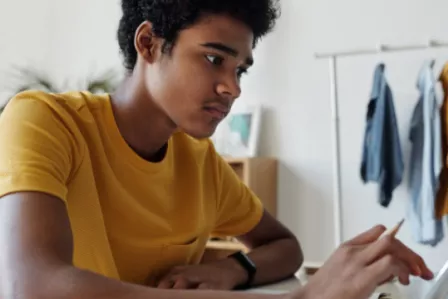Telefono Azzurro, part of the Italian Safer Internet Centre, has organised several ‘hackathon marathons’ (or hackathons): an event in which people work in groups to quickly create digital projects. These initiatives saw the participation of more than 120 schools throughout Italy, involving more than 3,000 students aged 11-18.

Despite the pandemic and its inevitable restrictions, which meant that many of the activities had to be carried out online, Telefono Azzurro nonetheless decided to put students at the core of its actions by promoting these national challenges.
Thanks to the dense network of collaboration with teachers, digital educators, and principals, students were asked to question themselves about some relevant issues related to their digital well-being. They were given two different starting points as an icebreaker for their conversations: "Building an internet we can trust" and "Who I am, what I look like, and what they see in me on the internet”. During their morning classes, participating students created a digital product (such as a podcast, an ebook, an Instagram profile, or a website landing page) to explain their opinions on these sensitive topics.
The different projects, evaluated by a jury whose members included representatives of the Ministry of Education, were subsequently presented during an online event. Students not only showed the audience their creations but also had the opportunity to interact with influencers, creators, journalists, and representatives of the various institutions present.
With the goal of promoting an inclusive peer-to-peer educational method, the resulting creations can be viewed on the project’s social networking profiles as well as on the Telefono Azzurro e-learning platform. This also allows other schools and students to draw inspiration from the materials for their own classroom activities. Discover more:
- Evento LIVE per l’annuncio dei vincitori dell’Hackathon 2.0 (LIVE event for the announcement of the Hackathon 2.0 winners) (recording)
- Hackathon 2.0 per le scuole secondarie di secondo grado (Hackathon 2.0 for secondary school in the second grade) (recording)
- Safer Internet Day 2021
Find out more about the work of the Italian Safer Internet Centre, including its awareness raising, helpline, hotline and youth participation services – or find similar information for Safer Internet Centres throughout Europe.
Telefono Azzurro, part of the Italian Safer Internet Centre, has organised several ‘hackathon marathons’ (or hackathons): an event in which people work in groups to quickly create digital projects. These initiatives saw the participation of more than 120 schools throughout Italy, involving more than 3,000 students aged 11-18.

Despite the pandemic and its inevitable restrictions, which meant that many of the activities had to be carried out online, Telefono Azzurro nonetheless decided to put students at the core of its actions by promoting these national challenges.
Thanks to the dense network of collaboration with teachers, digital educators, and principals, students were asked to question themselves about some relevant issues related to their digital well-being. They were given two different starting points as an icebreaker for their conversations: "Building an internet we can trust" and "Who I am, what I look like, and what they see in me on the internet”. During their morning classes, participating students created a digital product (such as a podcast, an ebook, an Instagram profile, or a website landing page) to explain their opinions on these sensitive topics.
The different projects, evaluated by a jury whose members included representatives of the Ministry of Education, were subsequently presented during an online event. Students not only showed the audience their creations but also had the opportunity to interact with influencers, creators, journalists, and representatives of the various institutions present.
With the goal of promoting an inclusive peer-to-peer educational method, the resulting creations can be viewed on the project’s social networking profiles as well as on the Telefono Azzurro e-learning platform. This also allows other schools and students to draw inspiration from the materials for their own classroom activities. Discover more:
- Evento LIVE per l’annuncio dei vincitori dell’Hackathon 2.0 (LIVE event for the announcement of the Hackathon 2.0 winners) (recording)
- Hackathon 2.0 per le scuole secondarie di secondo grado (Hackathon 2.0 for secondary school in the second grade) (recording)
- Safer Internet Day 2021
Find out more about the work of the Italian Safer Internet Centre, including its awareness raising, helpline, hotline and youth participation services – or find similar information for Safer Internet Centres throughout Europe.
- youth participation media literacy media education education digital skills
Related content
- < Previous article
- Next article >












